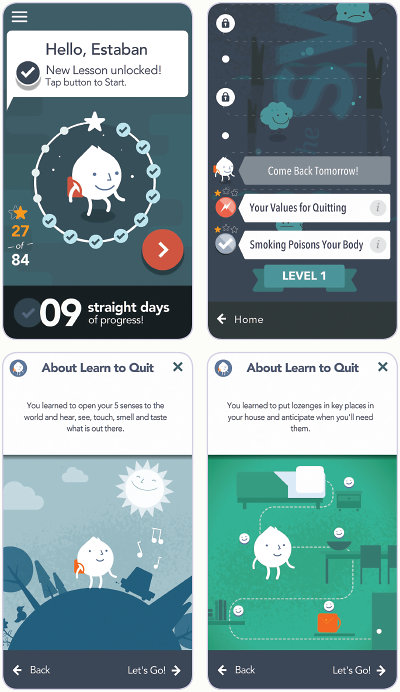While conducting his training in clinical psychology, Roger Viladarga, Ph.D., encountered many people with schizophrenia and other severe mental illnesses (SMI), which exposed him firsthand to the high prevalence of smoking in this patient population.
“I had read about the alarming statistics in journal articles, but now I could see how generalized this problem was, and how hard it was for these patients to receive professional cessation help,” he said. “They had struggles with their insurance, difficulty getting medications like Chantix. It felt like a social justice issue to get them some help.”
One thing these patients did have, though, was access to technology.
“I had seen in a survey that 70 percent of patients with an SMI had some type of mobile device and/or Internet capability,” Viladarga, an acting assistant professor in the Department of Psychiatry and Behavioral Sciences at the University of Washington, told Psychiatric News. “It led me to think that a mobile cessation app might offer some help.”
While it might seem like an easy solution to find—there are hundreds of cessation apps available—there were in fact some glaring issues.
“The problem with available apps is that only a handful are evidenced based, almost none has been tested in clinical trials, and none has been designed for the unique needs of someone with SMI,” he said.
Lessons Learned From Patients’ Challenges
So, with the help of a grant from the National Institute on Drug Abuse, Viladarga has been hard at work developing a new tool to help people with mental illness stop smoking.
Named Learn to Quit, Viladarga’s app is based on QuitPal, an official app of the National Cancer Institute (NCI) and one of the few using evidence-based guidelines for smoking cessation.
Over 200 hours of field testing with this app with SMI patients found that even this app was lacking in several areas of design and infrastructure.
“Our field participants needed a lot of guidance for even simple tasks, like entering information in the app, and they also had difficulty with the touchscreen,” he said. “So it’s important to build an app that has very few layers, with large icons, and the option to enter fractions of a cigarette as the patients frequently take a few puffs at a time and save the rest for later given the expense of cigarettes.”
Viladarga does note some positives, too. “These patients like the idea of tracking their behavior and having more awareness of their smoking levels, so this approach does have an appeal.”
He has now completed some tests with a paper version of the app, with encouraging results, and is working with colleagues in academia and industry to finish the mobile version, with an aim to carry out a clinical study sometime this year.
“I’m eager to get this out to the patients who need it, but it does take time to test new programs and make sure they’re ready,” he told Psychiatric News.
Therapists Need to Learn Apps as Well
“Technology is moving so fast, and I’m not sure that most clinicians are really prepared to integrate mobile apps into the fold,” said Douglas Ziedonis, M.D., a professor and chair of psychiatry at the University of Massachusetts Medical Center and an expert in nicotine addiction.
Ziedonis told Psychiatric News that since psychosocial cessation therapies are typically not reimbursed for dual-diagnosis patients, therapists do encourage patients to try self-help approaches like telephone quitlines or apps, but they do not know which ones would work best for their patients.
“Until more tailored tools like Roger’s app become available, we need some practical strategies to help clinicians identify appropriate apps and train them to use these apps so they can properly coach their patients.”
Ziedonis noted that a colleague at the University of Massachusetts, Edwin Boudreaux, M.D., recently co-wrote a paper that discussed a seven-point strategy to evaluate and select mobile health care applications, which he thinks would work for cessation apps as well.
Viladarga agreed that therapists need to be more engaged with their patients when considering mobile strategies. “We found in our user testing that the patients need a lot of guidance, so in creating the app, we are also developing a parallel coaching system to help the user understand and navigate the technical details, so the clinician can be well versed in how it works.”
“Remember, an app can help provide some tools and strategies for someone trying to quit, but the clinician is there to empower the person to want to quit,” Viladarga continued.
In terms of current options, he noted that clinicians can stick with the few applications that have been empirically tested or are based on clinical guidelines, which include items like the NCI apps QuitPal and QuitGuide, and SmartQuit, which was developed and tested by the Fred Hutchinson Cancer Center.
But while training and encouraging clinicians to embrace mobile cessation strategies might be a short-term goal, Ziedonis is also looking ahead and considering many intriguing questions.
“In many of these apps, you have to enter some personal data. Where do those data go?” he wondered. “What other risks or ethical considerations do we need to consider as we provide all these digital tools to our patients? That is critical to consider.” ■

